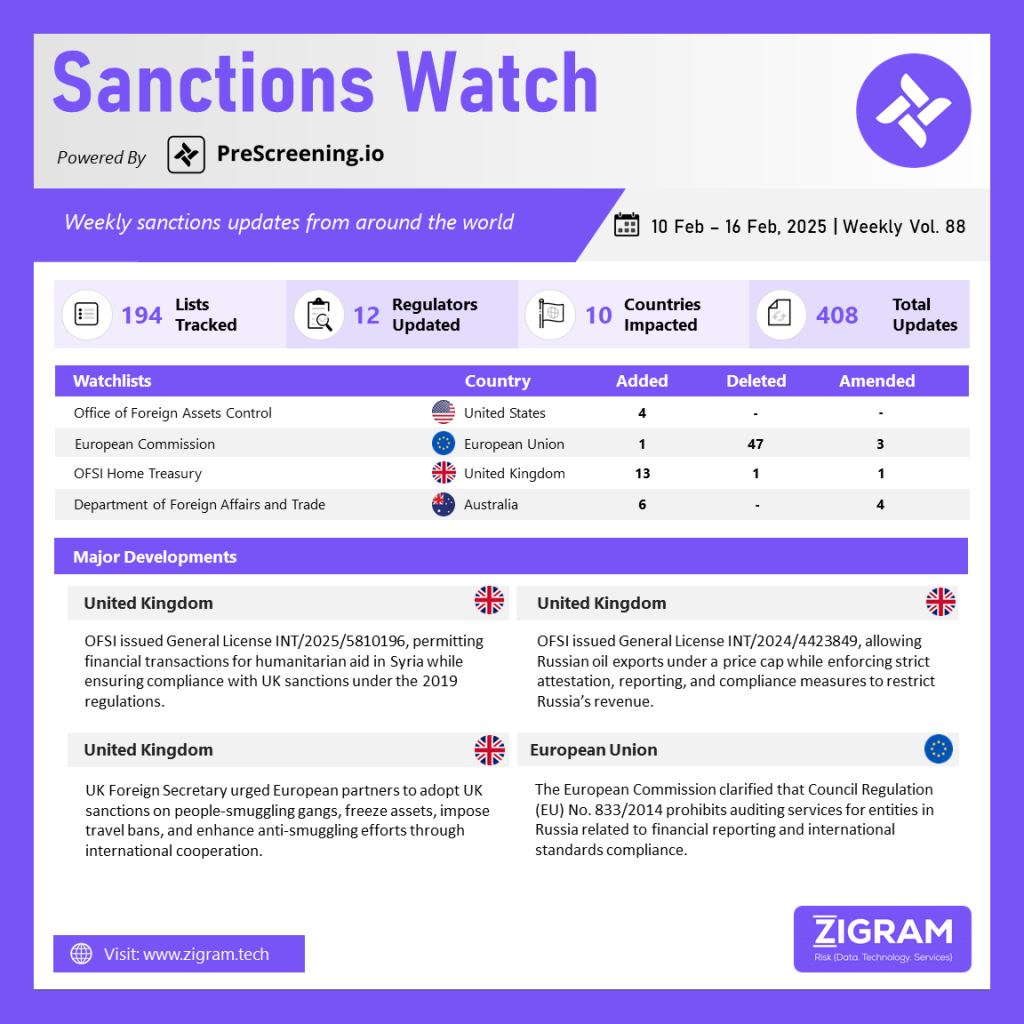Sanctions Watch Vol 88
In the latest edition of our Sanctions Watch weekly digest, we present significant updates on sanction watchlists and regulatory developments.
1. UK Issues General License for Humanitarian Aid in Syria Amid Sanctions Compliance
The UK’s Office of Financial Sanctions Implementation (OFSI) issued General License INT/2025/5810196 under the Syria (Sanctions) (EU Exit) Regulations 2019. This license allows for financial transactions related to humanitarian assistance activities in Syria, ensuring that aid organizations can operate without breaching UK-imposed sanctions. The license applies to the United Nations, international humanitarian organizations, NGOs, and other entities engaged in relief efforts, as well as their employees and implementing partners.
Under this license, Relevant Institutions, including banks and payment providers, are permitted to process payments related to aid distribution. The scope includes funding, procurement of goods, and other essential services necessary for humanitarian relief. Organizations utilizing the license must notify HM Treasury within 30 days of commencing activities.
The license does not override existing sanctions but ensures compliance by preventing funds from reaching designated persons or prohibited entities under the Syria Regulations. OFSI retains the right to revoke the license with at least three months’ notice. This move is part of the UK’s ongoing efforts to balance humanitarian relief with financial restrictions under the Sanctions and Anti-Money Laundering Act 2018.
2. UK Treasury Issues Updated Oil Price Cap General License to Strengthen Compliance Measures
The UK Treasury’s Office of Financial Sanctions Implementation (OFSI) issued an updated General Licence (INT/2024/4423849) under Regulation 64 of the Russia (Sanctions) (EU Exit) Regulations 2019. The licence allows the supply or delivery of Russian oil by ship to third countries, provided that the price remains at or below the set cap—$60 per barrel for crude oil, $100 per barrel for premium oil, and $45 per barrel for discount oil.
The licence imposes strict attestation requirements on service providers categorized into Tier 1, Tier 2, Tier 3A, and Tier 3B, requiring documented price verification before and during transactions. Additionally, record-keeping and reporting obligations ensure compliance, with providers mandated to report transactions to HM Treasury within specific timeframes.
This initiative is aimed at restricting Russia’s oil revenue, reinforcing global economic sanctions, and preventing breaches of the price cap mechanism. The licence remains in effect indefinitely, subject to amendments by the Treasury. This move underscores the UK’s commitment to economic sanctions enforcement and market stability in response to the Russia-Ukraine conflict.
3. UK Urges European Partners to Impose Sanctions on People-Smuggling Gangs
The UK Foreign Secretary, has called on European partners to adopt Britain’s pioneering sanctions targeting people-smuggling gangs. Speaking at the Munich Security Conference, he emphasized the need for coordinated international action to disrupt organized immigration crime networks. The UK plans to freeze assets and impose travel bans on smugglers, aiming to cripple their operations. Additionally, an £8 million funding package will provide education and employment opportunities in East Africa to deter irregular migration.
The UK and Italy will co-host a migration roundtable with European partners to discuss innovative anti-smuggling measures. The initiative aligns with the UK’s broader immigration enforcement strategy, which has led to the removal of nearly 19,000 illegal migrants and foreign criminals since the last election. Recent crackdowns have significantly increased enforcement activities, with over 600 arrests in January alone. Lammy stressed that addressing both smuggling networks and migration drivers is essential to securing borders and upholding national security.
4. EU Clarifies Auditing Ban on Russian Entities Under Regulation 833/2014
The European Commission clarified in FAQ 38 regarding Council Regulation (EU) 833/2014 that EU persons are generally prohibited from providing auditing services to the Russian government or entities established in Russia. However, an exception exists when auditing services are conducted for the consolidated financial reporting of a group controlled by an EU-based entity. This means that if an EU parent company requires auditing of its Russian subsidiaries to comply with international auditing standards, such services are not prohibited—provided they are conducted for the benefit of the EU entity.
Despite this exception, Article 12 of Regulation 833/2014 strictly prohibits EU operators from knowingly and intentionally participating in activities designed to circumvent these prohibitions. This reinforces the EU’s stance on preventing indirect support to Russian entities while allowing necessary compliance with international financial regulations for EU-based businesses. The latest update on 14 February 2025 confirms this nuanced approach, ensuring that EU companies can maintain regulatory compliance while adhering to the EU’s restrictive measures against Russia.
Know more about the product: PreScreening.io
Click here to book a free demo.
Sanctions Watch is a weekly recap of events and news related to sanctions around the world.
- #UKRegulations
- #HumanitarianAid
- #OFSI
- #SyriaCrisis
- #OilPriceCap
- #MigrationPolicy
- #BorderSecurity
- #FinancialCompliance
- #AntiSmuggling
- #EUAuditing
- #FinancialReporting
- #CorporateCompliance
- #EU833
- #RegulatoryUpdate
- #EUFinance
- #UKAid
- #TradeSanctions
- #SanctionPolicy
- #SanctionedEntities
- #SanctionResistance
